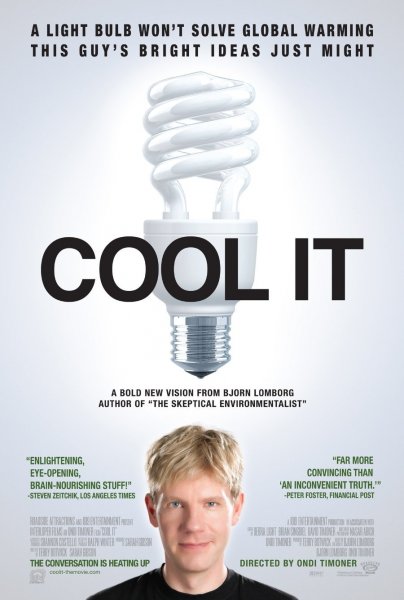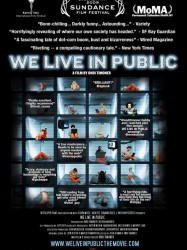Cool It is a american film of genre Documentary directed by Ondi Timoner released in USA on 8 november 2010
Cool It (2010)

If you like this film, let us know!
- Infos
- Casting
- Technical infos
- Photos
- Videos
- Film quotes
- Characters
- Music
- Awards
Released in USA 8 november 2010
Length 1h28
Directed by Ondi Timoner
OriginUSA
Genres Documentary
Rating69%










Cool It is a 2010 documentary film based on the book Cool It: The Skeptical Environmentalist's Guide to Global Warming by Danish political scientist Bjørn Lomborg. The film stars Lomborg, best known for authoring The Skeptical Environmentalist. It premiered in September in Canada at the 2010 Toronto International Film Festival and had a theatrical United States release on November 12, 2010. The film was directed by Ondi Timoner.
Comments
Leave comment :
Suggestions of similar film to Cool It
There are 3 films with the same director, 8968 with the same cinematographic genres, 2491 films with the same themes (including 43 films with the same 3 themes than Cool It), to have finally 70 suggestions of similar films.If you liked Cool It, you will probably like those similar films :

Dig! (2004)
, 1h47Directed by Ondi Timoner
Origin USA
Genres Musical theatre, Documentary, Musical
Themes Films about music and musicians, Documentary films about music and musicians, Documentaire sur une personnalité, Musical films
Actors David LaChapelle, Harry Dean Stanton
Rating76%





Le portrait croisé, filmé sur sept ans, de deux groupes de pop psychédélique aux destins divergents : The Dandy Warhols et The Brian Jonestown Massacre. Proches au début, les deux groupes deviennent peu à peu rivaux, les premiers obtiennent le succès et les seconds passent leur temps à saboter leur carrière. En revanche, si c'est le leader des Dandy Warhols qui se prête au jeu, comme narrateur en voix off, c'est plutôt le groupe d'Anton Newcombe, leader charismatique et cyclothymique du B.J.M, qui est valorisé dans le film, à la fois pour son incroyable productivité (en 1996 le groupe sort trois albums autoproduits) et pour ses frasques à répétition - violentes bagarres sur scènes, conflits d'ego à répétition, problèmes de drogue...
 , 55minutes
, 55minutesOrigin USA
Genres Documentary
Themes Environmental films, Documentary films about environmental issues, Disaster films
The fifty-minute movie was described as a "point-by-point PowerPoint rebuttal" of the Al Gore film An Inconvenient Truth. In his presentation, Hayward agrees with many of the points and issues covered by the Gore film, but shares how certain information may have been slanted by what he terms "global warming extremists," in order to create a darker image of the future. According to Hayward, "I agree that we’re warming, and I agree that we’re playing a role in it. What I disagree with is [Gore's] overall pessimism."

spOILed (2011)
, 1h30Origin USA
Genres Documentary
Themes Environmental films, Documentary films about environmental issues, Documentary films about technology, Disaster films
Rating66%





Spoiled begins investigating energy myths by asking if people today believe we are "addicted" to oil and if oil is destroying our lives the way other addictions do. The energy movie documentary explores human relationship to oil addiction, and reveals a pattern of misinformation, disinformation, and deception about energy myths.

Voices of Transition (2012)
, 1h5Origin France
Genres Documentary
Themes Environmental films, La mondialisation, Films about the labor movement, Documentary films about business, Documentary films about environmental issues, Documentary films about technology, Documentaire sur le monde du travail, Disaster films
Rating75%





Using interviews and overlays of graphics and text, the film presents the current problems facing industrial agriculture. It explores why in the interviewees' view the current industrial model is not up to the task of feeding the world's people. According to the film every calorie of energy contained in a food source currently takes between 10 and 20 calories of crude oil in the production of fertilizers and transportation to produce, leading to a strong dependence of the cost of food on oil prices. As a result of peak oil and increasing oil prices this dependence will lead to ever increasing food prices. According to the film, this dependence already represents a significant weak-spot in the global food supply chain. Additionally, agriculture is already responsible for 40% of greenhouse gas emissions, contributing to climate change. Furthermore, the film argues that the overuse of inorganic fertilizers has been responsible for the loss of soil fertility and threatens the complete loss of usable soil within the next decades through soil erosion and sinking crop yields. These effects, according to the film, can only be partly mitigated by the increased use of those same fertilizers. The loss of workplaces, the concentration of land in the hands of a few (allegedly a farm closes every 23 minutes in France) as well as the dependence on large corporations are enumerated as side effects of the industrialisation of agriculture since the 1920s. Companies, such as Monsanto and Bayer, control everything from seed stock to fertilizers and the necessary chemical mixes for hybrid plants, thereby controlling the entire supply chain. The film argues that this development was supported through subsidies from the World Bank. Interviews with Vandana Shiva, the founder of the Transition Towns movement Rob Hopkins and various agricultural experts serve to argue this viewpoint. The dependence on crude oil is illustrated through the example of the wholesale food market in Rungis.

The Island President (2012)
, 1h41Origin USA
Genres Documentary
Themes Environmental films, Documentary films about environmental issues, Documentaire sur une personnalité, Documentary films about politics, Political films, Disaster films
Rating71%





Ce documentaire s'intéresse au combat singulier du Président des Maldives, Mohamed Nasheed, contre le changement climatique. Les 1200 îles de l'archipel des Maldives sont en effet menacées de disparaître sous les eaux.

This Changes Everything (2015)
, 1h29Genres Documentary
Themes Environmental films, Documentary films about environmental issues, Disaster films
Actors Naomi Klein
Rating63%






The Yes Men Are Revolting (2014)
, 1h31Genres Documentary
Themes Environmental films, Documentary films about environmental issues, Disaster films
Rating66%





The Yes Men are a culture jamming group that use satirical performance art to make political points. While impersonating public relations personnel, they hold fake press conferences where they announce corporations, governments, and other organizations have taken a new, leftist stance. After seeing little gain from their pranks and increasing demands in their personal lives, The Yes Men debate whether they should continue. They are reinvigorated by the Occupy Wall Street protests and embark on a new campaign to combat climate change denial.

Aluna (2012)
, 1h31Origin United-kingdom
Genres Documentary, Adventure
Themes Environmental films, Documentary films about environmental issues, Disaster films
Rating73%





Le réalisateur Alan Ereira s'est rapproché des Kogi, une civilation colombienne isolée convaincue qu'il faut cesser de piller et dénaturer le monde.

Vanishing Point (2012)
Genres Documentary
Themes Environmental films, Documentary films about environmental issues, Disaster films
Rating69%






We Live in Public (2009)
Directed by Ondi Timoner
Origin USA
Genres Documentary
Themes Films about computing, Documentary films about business, Documentaire sur une personnalité, Documentary films about technology
Actors V. Owen Bush, Ondi Timoner
Rating70%





The film details the experiences of "the greatest Internet pioneer you've never heard of," Josh Harris. The dot-com millionaire founded Pseudo.com, the first Internet television network during the infamous tech boom of the late '90s. After achieving prominence amongst the Silicon Valley set, Harris became interested in controversial human experiments which tested the effects of media and technology on the development of personal identity. Ondi Timoner documented the major business-related moments of Harris's life for more than a decade, setting the tone for her documentary of the virtual world and its supposed control of human lives.
 Connection
Connection